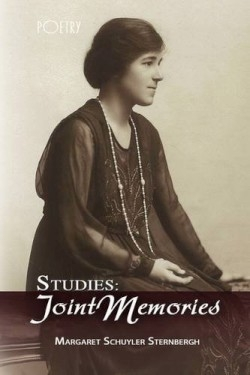Studies
Joint Memories
These poems reveal a woman deeply connected to her family, intensely frustrated by society’s expectations that women be obedient and quiet, and passionately desiring to experience all of life.
Published posthumously as a loving tribute to a mother who was “fiercely independent, stubborn and out to change the world to make it right,” Studies: Joint Memories is a gorgeously thick collection of poems written by Margaret “Mardi” Schuyler Sternbergh.
Discovered by daughter Ariel Compton-Cruce of California shortly after Sternbergh died at the age of eighty-five in 1982, the 150 poems listed alphabetically in Joint Memories represent roughly two-thirds of the works Sternbergh kept hidden in a small black notebook.
Written over the course of her life, the poems reveal a woman deeply connected to her family, intensely frustrated by society’s expectations that women be obedient and quiet, and passionately desiring to experience all of life. Several pay homage to her childhood home in Reading, Pennsylvania, the castle-like Stirling mansion her father, 1800s steel magnate James Hervey Sternbergh, built out of stones he imported from an area near Stirling Castle in Switzerland.
The lyricism of poems like “Memories” and “Sun on Leafless Branch” sing of the joy, strong sense of self, and whimsy that Sternbergh experienced growing up at Stirling. “Cemetery Walk” also nicely illustrates the tangible physical connection she felt to the land:
So often have I taken stroll
Upon the hillside past the knoll,
And see the flowers fragrant lie
Against the white and marble stone,—
Have read with reverence names unknown
And said: these too have trod
Where now tread I,—
Another, the bittersweet “The Gift,” recounts Sternbergh’s memory of her mother, Mary Candace Dodds, giving her pearls at the Harrisburg, Pennsylvania, train station:
Compassionate, these pearls, your gift,
Clean in their still perfection,
Warm my heart with the soft glow
Reflected of your love:
Sweetly reminiscent of one impulse
The book includes ten pages of photographs of Sternbergh at various stages of life. In most, as on the cover, Sternbergh is alone. But one includes her parents and several her younger sister, Gertrude, to whom the book is dedicated.
Compton-Cruce said she published the collection to show her mother’s independent spirit, which comes through in several of the poems that reflect her feelings toward Hitler, World War II, and Germany, where Sternbergh attended boarding school. Her strength and longing to effect change in any way a woman of that time period was able is apparent in many of her Europe-placed verses, including “Friends of Right,” which is a call to action against the Nazis:
Silence is no longer golden.
Let the light of clear mind shine forth,
Let the word of the true heart be spoken.
Come with all the emphasis of quiet strength…
Extend your power;
Stretch forth in this dark hour
As Compton-Cruce acknowledges on the Facebook page she created for Studies: Joint Memories, many of the poems are unnecessarily long and wordy. No doubt some are early drafts, and perhaps many—if not all—were never intended to be seen. But even in the least polished verses, there is an unmistakable ache and excitement for life, understanding, truth, and possibility.
As a whole, Studies: Joint Memories provides what Sternbergh’s poem “Out of this Moment” promises: “Rubies, sapphire, pearls beyond price, / Just for the miracle of faith…A joy and beauty that only you can make.”
Reviewed by
Cindy Wolfe Boyton
Disclosure: This article is not an endorsement, but a review. The publisher of this book provided free copies of the book and paid a small fee to have their book reviewed by a professional reviewer. Foreword Reviews and Clarion Reviews make no guarantee that the publisher will receive a positive review. Foreword Magazine, Inc. is disclosing this in accordance with the Federal Trade Commission’s 16 CFR, Part 255.

